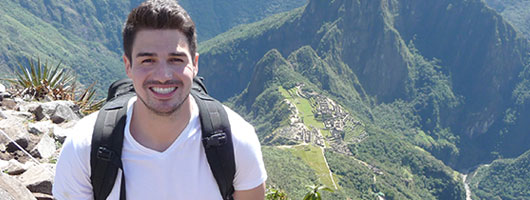 Pictured | Christopher Bell | Spanish // Minor in Latin American Studies | South Bend, Indiana (hometown)
Pictured | Christopher Bell | Spanish // Minor in Latin American Studies | South Bend, Indiana (hometown)
Photo credit | Christopher Bell (hiking at Machu Picchu, Peru)
Minor in Latin American/Latino Studies
Minor Requirements (15 cr. minimum)
All courses are 3 credit hours, unless otherwise designated.
The Minor in Latin American/Latino Studies consists of a minimum of 15 credits distributed as follows:
- two Core Courses (6 cr.)
- two electives (6 cr.)
- one 400-level course with a Latin American or Latino focus
Core Courses (6 cr.)
Select two courses in Latin American history, politics, society, or culture:
- ANTH-E 300 Culture Areas and Ethnic Groups
VT: Peoples and Cultures of Latin America - ANTH-E 335 Ancient Civilizations of Mesoamerica
- HIST-A 352 History of Latinos in the United States
- HIST-H 211 Latin American Culture and Civilization 1
- HIST-H 212 Latin American Culture and Civilization 2
- POLS-Y 330 Central American Politics
- POLS-Y 337 Latin American Politics
- SOC-S 362 World Societies and Cultures (Mexico or Costa Rica)
- SPAN-S 275 Hispanic Culture and Conversation
- SPAN-S 302 The Hispanic World 2
- SPAN-S 363 Introducción a la Cultura Hispánica
- SPAN-S 412 Spanish America: The Cultural Context
Electives (6 cr.)
The 6 credit hours of electives may be drawn from the following courses or an approved substitute. Students seeking to apply a course with a comprehensive international theme to the minor should be able to show that a major portion of their work, such as a term paper or similar assignment, dealt directly with a Latin American/Latino topic. To preserve the minor’s interdisciplinary focus, courses must be drawn from at least two departments.
Anthropology
- ANTH-A 385 Topics in Anthropology (where topics have a Latin American/Latino focus)
- ANTH-E 300 Culture Areas and Ethnic Groups
VT: Peoples and Cultures of Latin America
Communication
- SPCH-S 427 Cross Cultural Communication
- TEL-R 404 Topical Seminar in Telecommunications (when content applies; eg. Brazilian Film, Latin American Film)
History
- HIST-A 352 History of Latinos in the United States*
- HIST-F 300 Issues in Latin American History
- HIST-J 495 Proseminar for History Majors (where topics have a Latin American/Latino focus)
- HIST-H 211 Latin American Culture and Civilizations 1
- HIST-H 212 Latin American Culture and Civilizations 2
- HIST-T 190 Literary and Intellectual Traditions (where topics have a Latin American/Latino focus)
- HIST-T 390 Literary and Intellectual Traditions (where topics have a Latin American/Latino focus)
Political Science
- POLS-Y 324 Women and Politics (where topics have a Latin American/Latino focus)
- POLS-Y 330 Central American Politics*
- POLS-Y 337 Latin American Politics*
- POLS-Y 343 The Politics of International Development
Psychology
- PSY-P 391 Psychology of Gender and Ethnicity (where topics have a Latin American/Latino focus)
Sociology
- SOC-S 335 Race and Ethnic Relations (where topics have a Latin American/Latino focus)
- SOC-S 362 World Societies and Cultures (Mexico/Costa Rica)
- SOC-S 410 Advanced Topics in Social Organization
VT: International Inequalities and Global Issues (where topics have a Latin American/Latino focus)
Spanish
- SPAN-S 204 Second-Year Spanish 2 (for non-College of Liberal Arts and Sciences students)
- SPAN-S 275 Hispanic Culture and Conversation
- SPAN-S 303 The Hispanic World
- SPAN-S 317 Spanish Conversation and Diction
- SPAN-S 363 Introducción a la Cultura Hispánica
- SPAN-S 412 Spanish America: The Cultural Context
- SPAN-S 416 Modern Hispanic Poetry
- SPAN-S 496 Foreign Study in Spanish (in Latin America)
Women’s Studies
- WGS-W 400 Topics in Women’s Studies
VT: Gender, Sexuality, and Race in Contemporary United States Immigration - WGS-W 402 Seminar in Gender Studies
VT: Contemporary United States Immigration: Negotiating Identity and Community - One 400 level course with Latin American or Latino Studies focus (3 cr.)
Language Requirement
Language facility is an important part of regional and cross-cultural understanding. All students seeking this minor must complete second-year Spanish or its equivalent. Students registered in the College of Liberal Arts and Sciences complete the language requirement by taking Spanish to fulfill the language requirements for the Bachelor of Arts. Students in other divisions take SPAN-S 204 Second-Year Spanish 2 as an elective for the minor as well as meeting the language requirement. Students enrolled or contemplating this minor are encouraged to complete their language courses as early as possible in their program.
Study Abroad
Students are encouraged to study abroad as part of the minor. The spring break and summer programs, Language, History, Culture, and Society in Mexico, Building Sustainable Communities in Costa Rica, and Archeology in the Dominican Republic can be applied to the minor. The Mexico and Costa Rica programs also satisfy General Education requirements. Students can also discuss other study abroad options with Latin American Studies faculty and/or the Director of International Programs.
All coursework for the minor should be planned with an advisor from the Latin American/Latino Studies Committee. This helps achieve a program of complementary coursework tailored to a student’s specific needs and interests.